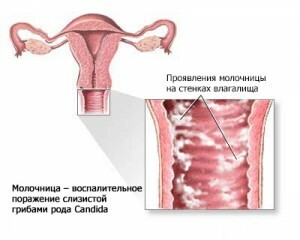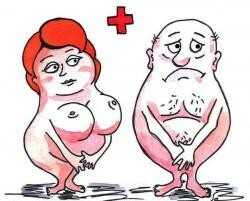Women are very familiar with the concept of "thrush", which they associate with very unpleasant and painful sensations. But with the combination of "thrush and menses", the state of health worsens several times.
Thrush: causes of

Thrush is a fungal disease that develops on the mucous tissues of the genital tract in women. There are several reasons for its occurrence:
- weakening of immunity;
- use of antibiotics;
- oppression of the vaginal microflora;
- hormonal imbalance.
Thrush appears at any age and can appear quite often. The course of thrush is variable in nature with periods of fade and sharp exacerbation. Doctors say that a particular exacerbation of thrush occurs in periods before and during menstruation. Is there a direct relationship between thrush and menstrual cycle?

Menses in no case are the cause for the onset of thrush, but act as a provocative factor:
- During a woman's mucous membranes, a favorable environment for the onset of a fungal disease is created.
- At the onset of critical days, the hormone balance of the body is somewhat disrupted. And this can affect the activity of fungus development.
- Menstrual discharge with a change in the acidity of the vaginal environment, frequent use of hygiene products on such days - these causes contribute to the manifestation of symptoms of thrush.
There are a number of factors that arise during menstruation that can cause candidiasis:
- Use in the menstruation period of tampons or pads, which in their composition have non-natural fibers, strong flavored impregnation or chemical components.
- Insufficiently frequent change of a woman's underwear.
- Use for intimate hygiene with soap that has an aggressive composition.
The main sign of the appearance of thrush is the itching before menstruation. Such feelings should alert the woman. Increased discomfort, as well as the appearance of cheesy discharge will be an accurate sign of exacerbation of fungal disease.

Thrush, with timely treatment, does not have a systemic effect on the body, but only creates local discomfort. Only in the case of the chronic nature of the course of the disease, the fungus can affect other organs. In such a situation, of course, there may be problems with menstruation due to abnormal ovarian functions or the occurrence of adhesions in the fallopian tubes.
Thus, experts point out that the monthly and thrush only have an indirect relationship and only aggravate the course of each other. Because of the constant discomfort with the combination of these processes, the state of health of a woman and the sleep can be seriously impaired.
Thrush and menses: the peculiarities of
. What are the features of thrush development in menstruation? First of all, there is an unpleasant smell, which will accompany and menstrual discharge. The most unpleasant and painful moment before menstruation is the burning sensation that occurs during urination.
In the process of menstruation, such feelings only increase. Critical days against the background of thrush can be more painful. Sometimes the allocation becomes more abundant, and their duration increases. The most troubling is the itching during menstruation, since no local medications at this time are applicable, and personal care products in such a situation do not help much.
Thrush after menses usually does not pass. It can even worsen and cause painful accompaniment on time and after intercourse. Itching after months can be accompanied by reddening of the skin in the intimate area.
Sometimes there is a combination of the appearance of the symptoms of thrush and delay of menstruation. This phenomenon has several explanations, as they say "one bad and one good."
In women aged 45 to 55 years - this may indicate the onset of menopause and a serious hormonal adjustment of the body, which is often accompanied by the "flourishing" of fungal diseases. Young girls may have similar processes in the background of the formation of menstrual function.
Some medications that are used to treat fungus can cause a delay in menstruation, but after stopping the drug, the menstrual cycle must be restored. If this did not happen, you need to look for another link between the absence of critical days and thrush.
The best reason is pregnancy. Thrush is a frequent companion of a woman in this condition. During the gestation of the child, the future mother's body weakens slightly and becomes vulnerable to disease. In addition, he begins to produce hormones progesterone and gonadotropin, which leads to a change in the hormonal background. Therefore, especially if there was unprotected sex, you need to do a test.
However, there is some clarification. Thrush during pregnancy does not occur before more than a couple of weeks. If the first signs of a fungal disease begin to appear already on the third day, then it is worth thinking about a "bad reason".Namely, that the milkmaid can get infected from a partner. Therefore, together with him you need to see a doctor.
Well, we should not rule out that thrush in the absence of menstruation can signal systemic problems in the body caused by serious diseases.
Without clarifying the reason for the delay, an attempt to align the monthly cycle with hormonal drugs can significantly complicate the course of the fungal disease.
How to treat thrush with monthly
As a rule, the combination of the most thrush and menstruation is not a particularly dangerous condition for health, but treatment should not be postponed.
At the first sign, especially if the menstruation has not yet begun, it is necessary to begin treatment in order to avoid complications during the critical days.
If, on the calendar of the monthly cycle, it is noticeable that the time for completing the full course of treatment is not enough, it is better to postpone it on the seventh day of menstruation, when the discharge is already over. The specialist can advise to take the complex drug terzhinan for the treatment of the most acute symptoms during menstruation.

Treatment of thrush is recommended to both partners
Treatment is recommended to begin immediately after the end of critical days. This is considered to be the most favorable period, since it is necessary to carry out a whole range of measures that include:
- use of medicinal antifungal drugs in the form of tablets;
- use of topical antifungal agents: ointments, cream, suppositories;
- syringing with herbal infusions and a bath with disinfectant solutions.
If a woman has a discharge, then the last two items are quite difficult to perform, and the use of candles is generally prohibited. Therefore, treatment will be incomplete and ineffective.
A special diet is a special diet with a lot of sour milk products and restrictions on everything sweet.
Timely treatment started will allow to get rid of thrush very quickly and from unpleasant sensations during menstruation.
Before using any medications, you should consult a physician specialist. There are contraindications.
